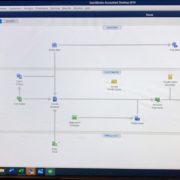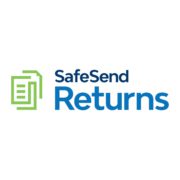Being a CPA During The COVID-19 Pandemic
Contributed by: Tavia Cederberg, Manager
It was November 2019, and tax planning was chugging along for our clients, with the occasional snowfall and anticipation of the Holidays. Of course, that was 19 months and several lifetimes ago…
Tax season of 2020 (for 2019 tax year) kicked off as per usual, with the occasional news “blurb” about a coronavirus more deadly than anything seen in recent times coming out of Asia. I’m a CPA, and while I do hear some news, I don’t have a lot of time to dwell on things, and frankly, until the President of the United States and his Health Advisory Team got up and made their announcements, I didn’t know what to think or believe. Apparently, this was the real deal, and we had closed our borders, shut down international flights, schools and sent home non-essential workers.
CPAs won the lottery ticket for being “essential.”
How essential were we?
Well, right about the time we are used to skidding into home plate with tax season, we, instead, found ourselves extended out until July 15, 2020. So, not only did we need to keep the momentum going — we needed to stay cranked at full steam to obtain funds for clients that found themselves shuttered by executive orders.
Suddenly, our jobs were not necessarily about computing taxes or doing audits. Instead, they were about reading the fine print in new legislation and interpreting it as fast as we could for stuff like “PPP,” “EIP,” “ERC,” or any number of acronyms to be announced.
We released the idea of “real rest.” Yes, we took an occasional long weekend, knowing we would return to overflowing email accounts and voicemail boxes. Long-term vacations were unheard of — and where would you go if you could? Many hotels and restaurants shut down, and many states had quarantines in place.
Flying? Did you dare? My office went to 50% capacity with the other 50% working from home. I have an office at my property in Florida, so I packed up and drove there, but the phone, email, and texts were unrelenting. My spouse found it incomprehensible. He saw me up all hours of the night and unable to grab one hour’s peace without someone needing something and insisting it was an “emergency.”
“Shelter in place 14 days to slow the spread.” We all remember it well. We all did our part, believing it would be over soon and things would go back to normal. Yet, here we are in May of 2021, and things still remain abnormal; our US Treasury is still printing trillions of dollars in stimulus packages that our client base is trying to obtain.
Frankly? I lost count of how many stimulus packages (and how many changes to those stimulus packages have occurred, changing the rules or “providing clarity.” I’ve read thousands of pages in publications and IRS FAQs and congressional records, trying desperately to figure out what we can and cannot do for our clients. I have no sooner figured out how to do it one way when the rules changed to be more inclusive or less inclusive.
Meanwhile, our phone rings daily with clients stating the IRS has lost their 2019 tax return, “What do we do?”
Apparently, CPAs were deemed essential and had to stay on deck, but the IRS was sent home. Tax returns were stacked in trailers (or elsewhere), left in piles where many still remain. They are literally still working the 2019 filing tax season, and things are a mess.
More of The Same During the 2021 Tax Season
The 2021 tax season (for the 2020 tax year) has been something that people will write books about — but I am not a writer, so I’ll leave that to the pros. However, I will say that our “Live Free or Die” state of New Hampshire refused to play nicely in the sandbox. The matter of assisting our clients in obtaining funds was only the beginning of the adventure. We also had to cope with the Federal and State governments changing their minds about the taxability of the monies.
We heard the SBA state the PPP funds WERE NOT taxable while Steve Mnuchin from the IRS state they WERE taxable. New Hampshire’s Department of Revenue decided “taxable” regardless of the Fed’s final disposition but wait — there is NH SB3 which remains pending as I write this. Pending? It’s May 4, 2021. New Hampshire’s filing deadlines remained at March 15 and April 15, 2021, for the 2020 season. How? What? Seriously?”
What more could possibly happen?
I’ll tell you what — the rules changed on the Employee Retention Credit (ERC). The Payroll Protection Program (PPP) was clearly the better deal, and we assisted our clients in obtaining these funds. We were now being told you can do BOTH if certain conditions were met, and you can go back to 2020 and get those funds. What’s the catch? Well? How about an IRS website that states the law passed but that the website is not updated … and to keep checking back?
Our phones and email accounts are lit up with clients wanting answers. Unfortunately, while we would love to provide clarity, lack of information from the IRS forced us to read raw legislation. Try it sometime to cure insomnia, but we cannot fall asleep yet because we are essential. We are CPAs on the financial front line.
Our audits had to stay scheduled as many of our non-profits needed funds made available thru stimulus packages and financial statements were vital. What to our surprise? Many of our clients that were not previously subject to Single Audits had received enough funding to “tip the scales.” This is basically a lot of words saying that we had double the work with the same number of people during a pandemic.
Somewhere in here, I have to mention that more than half of our firm was exposed or contracted COVID-19 during this time. I myself got it with a dose of double pneumonia. The larger point is that we had to constantly shift and make changes to accommodate for one or more people being “gone” due to quarantine.
It’s May 4, 2021, and the vaccination program is sailing along. My client base has received, or will be receiving, all PPP or grant funds that they are entitled to along with any ERC funding as well for both 2020 and 2021. The IRS is basically in my rearview mirror for the 2020 tax year, and I sit and ponder as I yank what’s left of my hair out and drink my 10th cup of coffee; how will they ever catch up at this point? In what year will they have this unraveled? We already know there will be many amended returns for various government changes after taxpayers filed returns. Also, Did I mention the Postal Service crisis amongst all of this? Hmm.
My conclusion is that Certified Public Accountants were among the most essential workers. My hat goes off to all types of essential workers, knowing how exhausting it has been with many choosing to stay home with unemployment offers higher than their normal wages or childcare costs and school shutdowns forcing their hand. Our nation has been short-handed with good workers. May God bless those that kept working, and may God bless America!
New Programs CPAs Navigated During The COVID-19 Pandemic
An overview of some of the many new legislation and financial programs CPAs had to learn and help clients navigate since the onset of the COVID-19 pandemic:
- Payroll Protection Program (PPP)
- Emergency Injury Disaster Loan (EIDL)
- Employee Retention Credit (ERC)
- Restaurant Revitalization Fund (RRF)
- Shuttered Venues Grant (SVG)
- Main Street New Loan Facility (MSNLF), Main Street Priority Loan Facility (MSPLF), Main Street Expanded Loan Facility (MSELF) – All three lending programs under the Federal Reserve’s Main Street Loan Facility
- Families First Coronavirus Response Act – (FFCRA)
- Economic Impact Payments – (EIP)
- Toilet Paper – (TP)
- Dunkin Donuts – (DD)
- Personal Protective Equipment (PPE)
- Coronavirus Aid, Relief, and Economic Security Act (CARES Act) (signed into law March 27, 2020) – 335 pages https://www.congress.gov/116/plaws/publ136/PLAW-116publ136.pdf
- Consolidated Appropriations Act (CAA) 2021 (signed into law December 27, 2020) – 2,124 pages https://www.congress.gov/116/bills/hr133/BILLS-116hr133enr.pdf
- American Rescue Plan Act (ARPA) of 2021 (signed into law March 11, 2021) – 242 pages https://www.congress.gov/117/bills/hr1319/BILLS-117hr1319enr.pdf
- FAQs: Employee Retention Credit under the CARES Act – https://www.irs.gov/newsroom/faqs-employee-retention-credit-under-the-cares-act
- FAQs: Coronavirus and Economic Impact Payments – https://www.irs.gov/newsroom/coronavirus-and-economic-impact-payments-frequently-asked-questions
- FAQs: Payroll Protection Program Loans – https://home.treasury.gov/system/files/136/Paycheck-Protection-Program-Frequently-Asked-Questions.pdf










